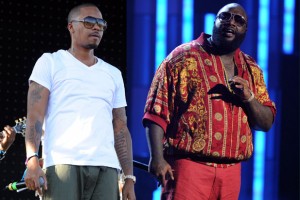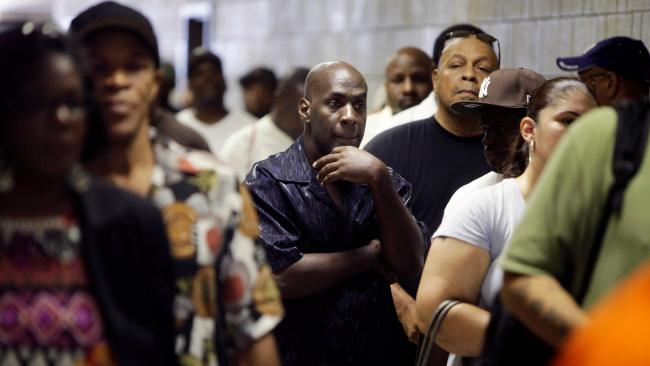(ThyBlackMan.com) I worked and lived in South Africa for five years only recently having been transferred to my employer’s West Africa office in Abuja, Nigeria. My musical tastes, prior to that transfer were largely confined to underground hip-hop and 70s soul. As any expat should, I’ve opened up to new music since moving abroad.
In Nigeria just about everything in the pop music scene is filled with incredible energy. D’Banj, Rayce, Naeto C, Iyanya, 2face Idibia, and P-Square being just a few of the more popular hit makers. Their fan base is loyal and global. Enough revenue is being generated in and outside Nigeria to attract US based music makers like Kanye West, Rick Ross, and Akon who have all collaborated with the more popular Nigerian artists in recent years. Somehow the Pan-Africanist in me appreciated these artists more from those interactions with African talent, even though I’m cognizant that the profit motive above and beyond any notions of Diasporan brotherhood is driving it. But it’s called the music business for a reason.
Recently, I began to think about the ways in which African-American artists navigate relationships with their African counterparts. Two highly divergent examples come to mind—Nas and Rick Ross.
Channel O (one of the leading African music video networks) recently nominated Somali born and raised, Canadian-based rapper K’Naan in a  collaboration with Nas for his song Nothing to Lose (Remix). I have no idea if anyone paid attention to the original version, but its revision was the only one getting any burn in Johannesburg which has shown quite a bit of love to K’Naan since the Soccer World Cup held in South Africa in 2010. His song Wavin Flag became the anthem of the games eclipsing the other event endorsed tunes by R. Kelly and Shakira. South Africans are not widely known for an embrace of Pan-Africanism but plenty of solidarity with this particular son of the soil was on full display during the period.
collaboration with Nas for his song Nothing to Lose (Remix). I have no idea if anyone paid attention to the original version, but its revision was the only one getting any burn in Johannesburg which has shown quite a bit of love to K’Naan since the Soccer World Cup held in South Africa in 2010. His song Wavin Flag became the anthem of the games eclipsing the other event endorsed tunes by R. Kelly and Shakira. South Africans are not widely known for an embrace of Pan-Africanism but plenty of solidarity with this particular son of the soil was on full display during the period.
Nothing to Lose (Remix) is respected for a reason. Nas brought his It Ain’t Hard to Tell as opposed to his Oochie Wally game to this match. But K’Naan has never sounded better with vivid story telling taking the listener as close to the streets of Mogadishu, Somalia as most are ever likely to go. He matches Mr. Jones verse for verse. Nas and K’Naan complement each other so well on this track that the listener could only hope for an LP or at least an EP with these two veterans going back and forth throughout. There is a bit of “whose hood is tougher” machismo flowing through this track, but it’s a very subtle and almost negligible undercurrent. That the political violence in East Africa is characterized as being no different than what is mistakenly projected as apolitical turf wars and petty drug beefs in black America, is the greatest triumph of the track. Somewhere in the value chain of war—of the street, ethnic, or clan variety—is politics. Nas and K’Naan GET that.
K’Naan Nothing to Lose (Remix) ft. Nas
[youtube loGqg3U4pg4]
And then there’s Rick Ross. To his credit, the brother travels all over the African continent. It seems that tour stops in South Africa secure a prominent spot on his calendar. The display of his in-your face promotion posters was familiar to me from my years as a Johannesburg resident. You saw them on signposts along Oxford Road and all over the M1 Highway. Ricky Rozay’s Joburg promotion team put in work! As a result, I was not particularly surprised to have seen handbills, fliers, and posters for a recent Rick Ross tour date in Nigeria’s largest city, Lagos. And Lagos loves this brother right back! But just as I was prepared to fully embrace American hip-pop stars and just a moment before pressing send on that Maybach Music t-shirt order, Rick Ross made me temporarily wish that 50 Cent had won their war for rap relevance several years ago. Or at least he did at my first gander at the latest music video version of his single “Hold Me Back” set in the informal settlements of Lagos, Nigeria.
American music stars “slumming” is nothing new. Michael Jackson famously stomped around Brazil’s City of God in his video for “They Don’t Care About Us.” That was way before the Maybach Music era. But Rick Ross’s video was on well…some other level. It curiously starts with news footage related to the Nigerian Civil War that ended in 1970. At first, I didn’t make the connection to the scenes of Ross traipsing about what is portrayed as a fairly hopeless urban wasteland. I know Lagos well. It’s more multilayered than this short video would have us believe, but it there is more than a little dystopia up in that piece. Real talk. And although I would never claim to be a Nigeria expert, I can say with some degree of confidence that the Civil War which came a few years after its independence has defined the country in more ways than many would care to admit. Maybe Rick Ross and his team were reading Nigerian scholar Toyin Falola’s work. Probably not. But at that point I wouldn’t have been surprised if the apex predator of political hip-hop, Immortal Technique, was announced as the newest associate of Maybach Music and had been draped with a crew chain mid video. Ricky Rozay had hit me with something deep enough in those first few moments to think that perhaps he was going to drift into being a “conscious” hip-hop artist, as troubling as that tag often is.
Amid all on display in what is really a peculiarly fascinating video, Ross doesn’t have time for a recent Lagos history lesson. The city is “improving” under the leadership of its popular governor, Babatunde Fashola, but some of this “progress” is being achieved through the removal of the very communities Rick Ross is driving, boating, and mean mugging through during the course of the video. In its efforts to modernize, the poor people who built the cities are being moved out of them—quickly. Sound familiar American readers? If not, visit DC or other gentrified locales throughout North America. Maybe Ross was on some Marvin Gaye/Curtis Mayfield social commentary.
But come on, this is Rick Ross! What I can tell you is that Officer Ricky or his crew would have no chance against the “Area Boys” of Lagos, Nigeria. But the video sure makes you think Ross has got a shot of taking over Africa’s largest city. One absence is glaring as you move through this clip. Where was Nigerian Maybach music member Wale in all of this? And just when you reason that the social activism sort of embedded in the images is transforming Rick Ross into a solid candidate to be the third member of Cornel West and Tavis Smiley’s Poverty Tour, the litany of bitches, niggas, hos, and some gynecological madness that I can’t even repeat here, brings the viewer crashing back to reality. The video, linked to a song that doesn’t quite fit, leaves the viewer with more questions than answers.
But Rick Ross is onto something. But surely blaming “niggas” for all of the misfortune in Nigeria is on some warped international Bill Cosby “Call Out Tour” logic. Or maybe Rick Ross is channeling Keith Richburg in a way that doesn’t quite take the viewer on the full journey of Nigerian political realities necessary to halfway prove a relevant point on the issues. Unless “niggas” is a metaphor that conflates corrupt Nigerian leadership with extractive industries companies like Shell, Exxon Mobil and BP. Now with that, I’m really stretching, bending and twisting logic in an attempt to hang with Ricky Rozay. And the profuse sweating generated by that lie will require more than a few sips of 50 Cent’s old Vitamin Water to put me back on track. Maybe Nas and K’Naan can take up Mr. Ross’s incomplete concepts when next in Lagos.
On display in these two music videos are two distinctly different approaches, by three very different artists, navigating their own personal connection to Africa. My sincere hope is that two of the trio keeps moving forward and that one does a course correction as he just might be on to something of value.
Staff Writer; Christopher Keith Johnson

















Very insightful article. I think a lot more artist need to become so called “conscious” about the words that they convey. They don’t realize the power they have to enlighten the minds of the youth.
Thanks for the link. I never heard of RR until I read your Article but his video doesn’t even scratch the surface of slums in Africa. Nigeria is the richest country in W. Africa and probably in the top 5 richest countries in Africa. Can you imagine what the slums of Liberia, Somalia, Uganda, Sudan……..look like.
To those Nigerians that dislike the video, they need to stop this war on Christians and focus on uplifting one another. We need more RRs out there impacting people directly because for years governments in Africa have failed the people. Case in point, Nigeria is also a member of OPEC and the only oil producing nation in sub-saharian Africa.
Here’s an unbroken YouTube link from Ricky Rozay’s team at Maybach Music. I think it should remain posted a while.
http://www.youtube.com/watch?v=xu60JoFAN78
@Hoodgirl. Thanks for your comment. And my omission of gender is a glaring one! Sisters definitely need to check me on that at all times. I appreciate that. You are absolutely right in that the issues are so huge. Bigger than hip-hop for sure! I had to watch this video multiple times before I could even think to write a word. Overwhelmed was an understatement. Then, once calm, I really wanted to view it in a more active way as someone who has spent a lot of time in the city, but was still an outsider. I’m in the 1% when I’m in Lagos. RR was building with people that I see but don’t actively engage. I don’t know their story. The lyrics–horrific. But the poverty and race by the government to literally wash these people away is much worse. Thanks for your comment. Again a link to the video in question below:
http://www.youtube.com/watch?v=eqQnyL3xcJM&feature=player_embedded
Great Article. I have a friend of 28 years from Nigeria who is Yoruba. The divide between the haves/havenots “throw in gender” surpasses racism. Also, my husband is from Liberia. Let me put it this way, his parents are not descendants of Americo-Liberians. He has a different view of Pan-Africanism. The problems that exist throughout Africa have nothing to do with HIP HOP!
@Julian. Agree. But the divide between the haves and havenots in Nigeria is almost as crazy as any racial, ethnic, or religious beef on the continent. Almost feudal. A real redistribution of wealth has got to be pursued here. RR shows you that extreme from slum to premier concert venue in the video. I hope the many, many critiques of this video wake him up a bit. Not much hope of that. The brother is in Africa more than just about any other American based artist. He might be beating Akon on frequent flyer miles to the continent. If folk here can demand more from him he might just adjust. He loves African money! And there’s a lot of that for American artists here. Less for the ghetto resident of Lagos.
That city definitely has its highs and lows. But its just that. Highs (extreme wealth) and lows (abject poverty). The middle class is growing, but that growth has got to accelerate.
A complete Disgrace, complete, no credit due, no realization due, just Filth. But, a necessary filth, this is further proof, Pan-African beliefs in other black nations is a necessary condition. Tell me if this would fly in any Pan-African country. This emboldens me & my beliefs. Africa is the only way, blacks will regain a sense of self respect. To hell with him & his followers, African leaders with a strong self worth will attack this video with a fierce staunch uniform belief. The west & it’s people only belittles US.
@ DL. So so correct. and just in case anyone missed Rick Ross’s video, here’s a link:
http://www.youtube.com/watch?v=eqQnyL3xcJM&feature=player_embedded
I’ll be in Lagos next Tuesday. To be honest, any Nigerian will tell you that this isn’t a movie set created for a video. When Immortal Technique says that the “3rd World” makes the hood in America look like paradise, he ain’t joking or playing. It is beyond real!
A number of Nigerians are commending Rozay for going where very few if any American artists have ever been. Even with a trill security detail. I just so wish he had chose another song! Just when I think I am fully getting where he is going he hits me with that “riggidy raw” as Das Efx used to say. And not in a remotely good way. The song on some level makes Juicy J seem like one of the Winans. Just raw for no good or meaningful reason.
But still theres a story here. That Rozay road through the trillest hood on earth to get to a show for the sons and daughters of the men who are largely creating the conditions on display is real talk.
I like Lagos because you can’t ever fully escape what globalization, corruption and the legacy of colonialism has done. To get to the Hilton/Sheraton/Crowne Plaza you have to pass through hell. That can be avoided in ATL, DC, LA, NYC, and almost everywhere else in the US. You are constanly reminded in Lagos.If you turn a blind eye to that its on you.
Ahhh the smell of fresh money! The commodification of hip hop and black culture continues and our less conscious artists are happy to march lockstep with the music execs. Blacksploitation 3.0